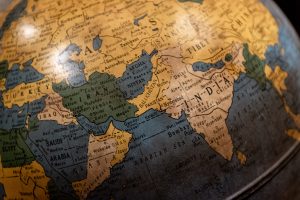As the 21st century unfolds, India is poised to emerge as a global powerhouse across various sectors. With a burgeoning population, a rapidly expanding economy, and a wealth of human capital, India is positioned to lead in fields ranging from technology and innovation to renewable energy and geopolitics. This article explores how India’s multifaceted progress is paving the way for its leadership in the 21st century across diverse sectors.
Economic Transformation

India’s economic growth trajectory has been nothing short of remarkable. With a burgeoning middle class, a dynamic workforce, and a burgeoning startup ecosystem, India’s economy is projected to become one of the world’s largest by GDP. The Indian government’s emphasis on ‘Make in India’ and ‘Atmanirbhar Bharat’ (self-reliant India) initiatives is bolstering domestic manufacturing, promoting innovation, and encouraging foreign investment.
The digital revolution is playing a pivotal role in this economic transformation. India’s information technology and software services sectors have long been recognized globally, but the country is now expanding its digital footprint further with initiatives like Digital India. This digitization drive is not only fostering efficiency but also creating opportunities for technology-driven innovations that can propel India to the forefront of the tech world.
Innovation and Technology

India’s burgeoning technology sector is rapidly positioning the nation as a global innovation hub. With a robust pool of skilled engineers, scientists, and researchers, India is making significant contributions to areas such as artificial intelligence, biotechnology, space exploration, and renewable energy. The country’s strides in space technology, exemplified by the Mars Orbiter Mission and Chandrayaan missions, showcase its prowess on the international stage.
Moreover, India’s startup ecosystem is witnessing exponential growth, attracting venture capital from around the world. Tech hubs like Bengaluru (Bangalore) and Hyderabad are nurturing a culture of innovation, with startups spanning sectors like fintech, health tech, edtech, and agritech. These innovations are not only catering to domestic needs but are also shaping solutions with global relevance.
Renewable Energy and Sustainability

In the realm of renewable energy, India’s commitment to sustainability is evident. The nation is aggressively pursuing renewable energy sources such as solar, wind, and hydroelectric power. India’s solar energy capacity has witnessed remarkable expansion, with ambitious targets set for the future. The International Solar Alliance (ISA), headquartered in India, exemplifies the nation’s dedication to promoting clean energy on a global scale.
India’s push for sustainability extends beyond energy. The government’s Swachh Bharat Abhiyan (Clean India Mission) and efforts to reduce single-use plastics signify a commitment to environmental preservation. These initiatives not only contribute to India’s global leadership in sustainable practices but also inspire other nations to prioritize ecological consciousness.
Geopolitical Significance

India’s influence is not confined to its borders; it extends to the global geopolitical arena. Its democratic values, strategic partnerships, and contributions to international organizations position it as a key player in shaping global discourse. As a member of organizations like BRICS (Brazil, Russia, India, China, South Africa) and G20, India collaborates with other emerging economies to address global challenges.
Furthermore, India’s increasing participation in global peacekeeping operations underlines its commitment to maintaining global stability. Its responsible nuclear posture and role in promoting regional security contribute to its standing as a responsible global player.
Education and Human Capital

India’s demographic dividend, characterized by a youthful population, is a major asset in the 21st century. The nation is prioritizing education and skill development to harness this demographic potential. Initiatives like the National Skill Development Mission are training the workforce of the future, ensuring that India’s human capital remains globally competitive.
India’s prowess in education is further exemplified by its Institutes of Technology (IITs) and Institutes of Management (IIMs), which consistently rank among the world’s best. These institutions are nurturing the next generation of leaders and innovators who will drive India’s leadership across various sectors.
As the 21st century unfolds, India is poised to lead across a spectrum of sectors, leaving an indelible mark on the global stage. Its economic prowess, technological innovation, commitment to sustainability, and active participation in global affairs position India as a multi-faceted leader.
While challenges persist, India’s trajectory is marked by resilience, adaptability, and a determination to overcome obstacles. With its rich history, diverse culture, and rapidly evolving economy, India is carving a distinct path toward global leadership in the 21st century, shaping the destiny not only of its own people but of the world at large.



